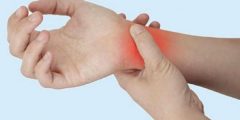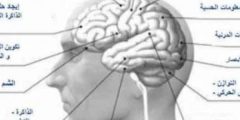Nerve weakness
The term nerve weakness refers to general diseases and neuropathy (in English: Neuropathy). Nerve weakness is often classified based on the type or location of the affected nerves. Nerve weakness can also be classified based on the diseases that cause them. For example, it is called neuropathy caused by a disease. Diabetic neuropathy.
Treatment of nerve weakness
Treating nerve weakness is by controlling the symptoms and treating the cause that led to nerve weakness. In many cases, treating the cause that leads to neuropathy is very helpful in reducing or disappearing the symptoms of neuropathy, and in other cases when the cause of neuropathy is pressure on the nerves, such as the presence of a tumor. The treatment in this case is surgery. Also, in the case of diabetic neuropathy, controlling blood sugar levels is important to prevent further damage to the nerves.
Painkillers such as acetaminophen and ibuprofen can relieve the pain that can be caused by nerve weakness, or the damage that can result from this condition, but in general they cannot control the pain caused by neuropathy, as Excessive use of these medications can cause greater harm, so it is recommended to take these painkillers with caution. As for other medications that can be taken to relieve and control pain resulting from nerve weakness, they are as follows:
Read also:What is the treatment for vertigo?- Antidepressant medications: The Food and Drug Administration has approved the use of antidepressants in the treatment of diabetic neuropathy. One of the depression medications that can be used in this case is Duloxetine. Other examples of tricyclic antidepressants include amitriptyline. Amitriptyline) and imipramine.
- Anticonvulsants can be used to treat diabetic neuropathy. Examples of anticonvulsants include Pregabalin and Gabapentin.
- Opioids and opioids such as oxycodone and tramadol.
- The doctor can prescribe topical medications that relieve pain, such as capsaicin cream and lidocaine patches. Alternative or complementary treatments can be resorted to acupuncture and physical therapy, which may help in some cases.
- There are studies that have proven the effectiveness of taking a single daily dose of 600 mg of the antioxidant alpha-lipoic acid in treating diabetic neuropathy in the short term, but these studies have not yet proven the effectiveness of this treatment in the long term.
- If previous treatments fail to control pain, Trans-Cutaneous Electrical Nerve Stimulation can be performed, although information about the effectiveness of this method is insufficient yet, but guidance issued in 2010 by the American Academy of Sciences American Academy of Neurology stated that this method can be effective in relieving pain caused by diabetic neuropathy.
Read also:Diagnosis of tetanus
Tips and home remedies for nerve weakness
People with weak nerves should pay special attention to their feet to reduce the chance of foot ulcers and infections. The feet are the most common area of the body affected by nerve weakness, so the following things can be done:
- Wash your feet with warm water every day and dry them after washing them, especially between the toes.
- Do not walk with bare feet, and do not wear tight, inappropriate or comfortable shoes for the feet.
- Examine the feet daily, and look for the presence of ulcers, wounds, or any other problems.
- Keep nails trimmed.
- Wearing thick, soft socks can help prevent irritated feet.
- See a doctor if you notice any foot problems.
- Massaging the feet improves blood circulation, so it is recommended to massage the feet regularly.
- Quitting smoking will improve blood circulation; Smoking limits blood circulation to the extremities, thus exacerbating foot problems.
Types of nerve weakness
There are several types of neuropathy, which are as follows:
Peripheral neuropathy
Peripheral neuropathy results from damage to the peripheral nerves in the body. The peripheral nerves send signals from the brain and spinal cord to the rest of the body. People with peripheral neuropathy describe nerve pain as a feeling of stabbing, burning, or tingling, and in many cases In some cases, the patient's symptoms improve; Especially if the cause of the neuropathy is treatable, and medications can relieve the pain caused by peripheral neuropathy.
Read also:Parkinson's disease mechanismThere are many reasons that may lead to peripheral nerve damage, perhaps the most important of which is diabetes, exposure to an injury that can lead to peripheral neuropathy, infection, metabolic problems, genetic problems, and exposure to toxins. In more detail, these are the reasons that can cause neuropathy. Peripheral or peripheral:
- Addiction to alcohol, which may lead to addicts making poor food choices; Which leads to a deficiency in vitamins, which in turn leads to peripheral neuropathy.
- diabetes; More than half of diabetics suffer from neuropathy.
- Some types of medications, especially chemotherapy drugs used to treat cancer, can cause peripheral neuropathy.
- Immune diseases; Such as Sjogren's syndrome, lupus, rheumatoid arthritis, or Guillain-Barre syndrome.
- Examples of infections that can lead to neuropathy include Lyme disease, shingles, hepatitis C virus, leprosy, diphtheria, or HIV.
- Vitamin deficiency; A deficiency of vitamin B1, B6, or vitamin B12 deficiency can lead to peripheral neuropathy, and a deficiency of vitamin E and niacin can lead to nerve problems. Because these vitamins are important for the safety of nerves in the body.
- Suffering from some diseases, such as kidney or liver disease, connective tissue disorders, or hypothyroidism.
- Tumors.
- Bone marrow problems.
The symptoms that a patient with peripheral neuropathy may experience are as follows:
- A feeling of tingling, numbness, and tingling in the feet and hands. This symptom appears gradually, and the tingling and tingling can escalate to the legs and arms.
- Extreme sensitivity to touch.
- Falls and lack of coordination during movement.
- Muscle weakness, or paralysis if the motor nerves are damaged.
Cranial neuropathy
Cranial neuropathy occurs when any of the twelve cranial nerves, which are the nerves that exit directly from the brain, are damaged. Examples of cranial neuropathy include: Optic neuropathy and auditory neuropathy, while optic neuropathy results from damage to the optic nerve, which transmits visual signals from the retina to the brain, and auditory neuropathy, which is responsible for hearing, results from damage to the nerve that transmits signals from the inner ear to the brain.
Autonomic neuropathy
Autonomic neuropathy occurs when damage occurs to the nerves of the autonomic nervous system. These nerves control the heart and blood circulation, including blood pressure. They are also the nerves responsible for digestion, the intestines, the bladder, sexual response, and sweating. The nerves of other organs of the body can be affected.
Focal neuropathy
Focal neuropathy is the neuropathy of a single nerve or a specific group of nerves, or when a specific area of the body is affected by neuropathy.









